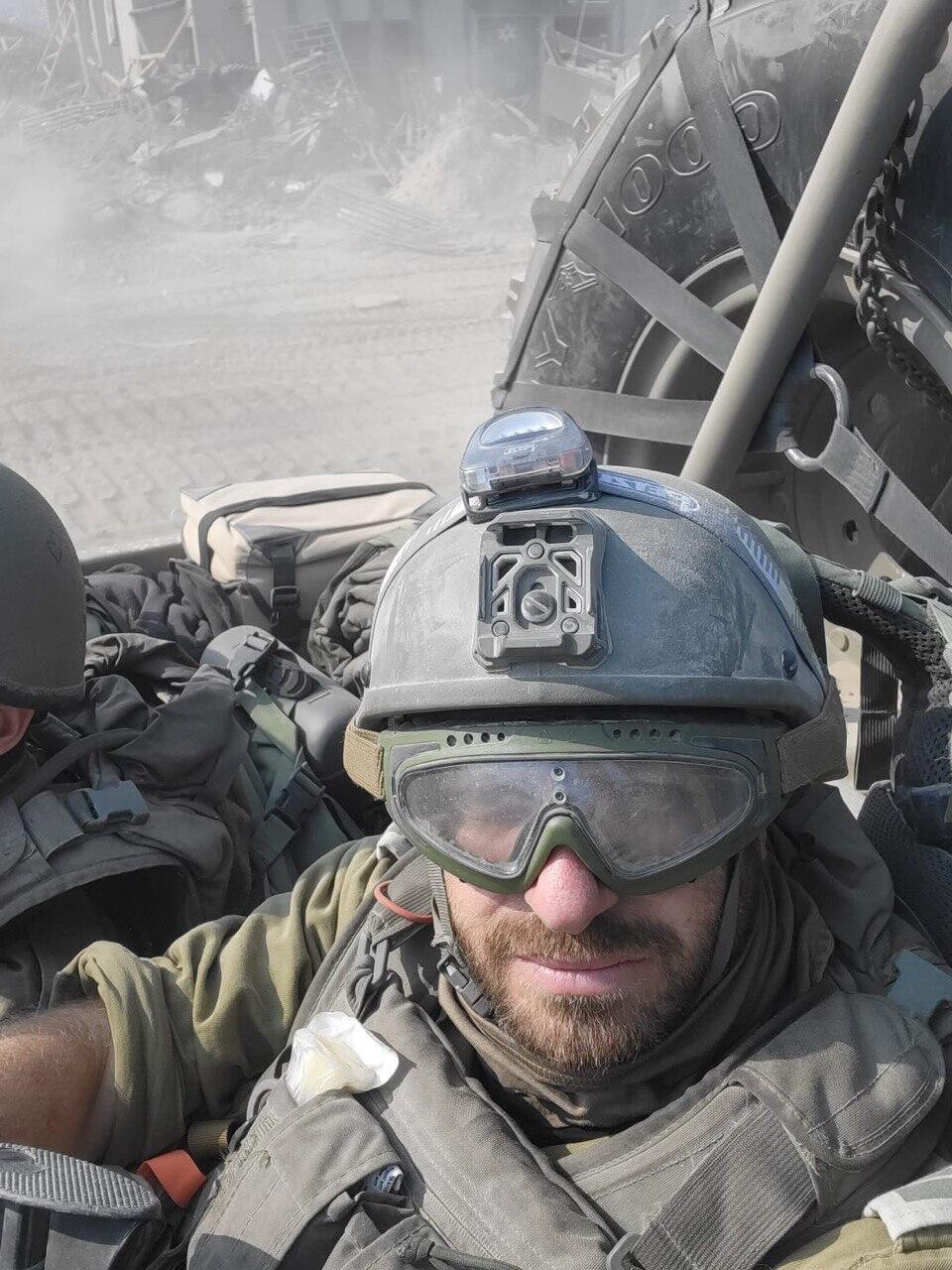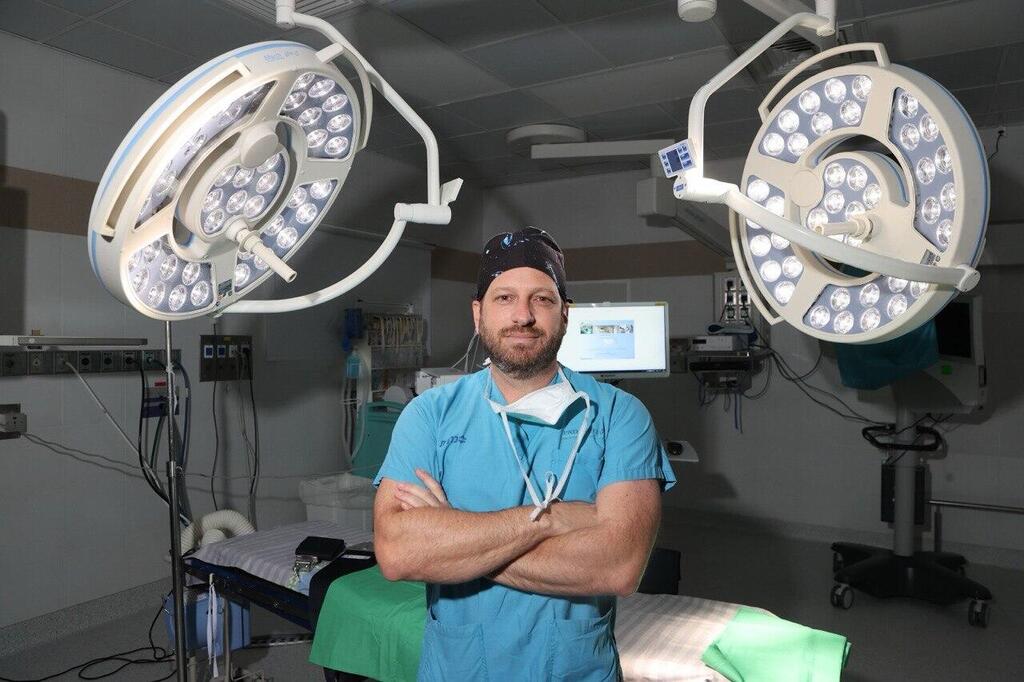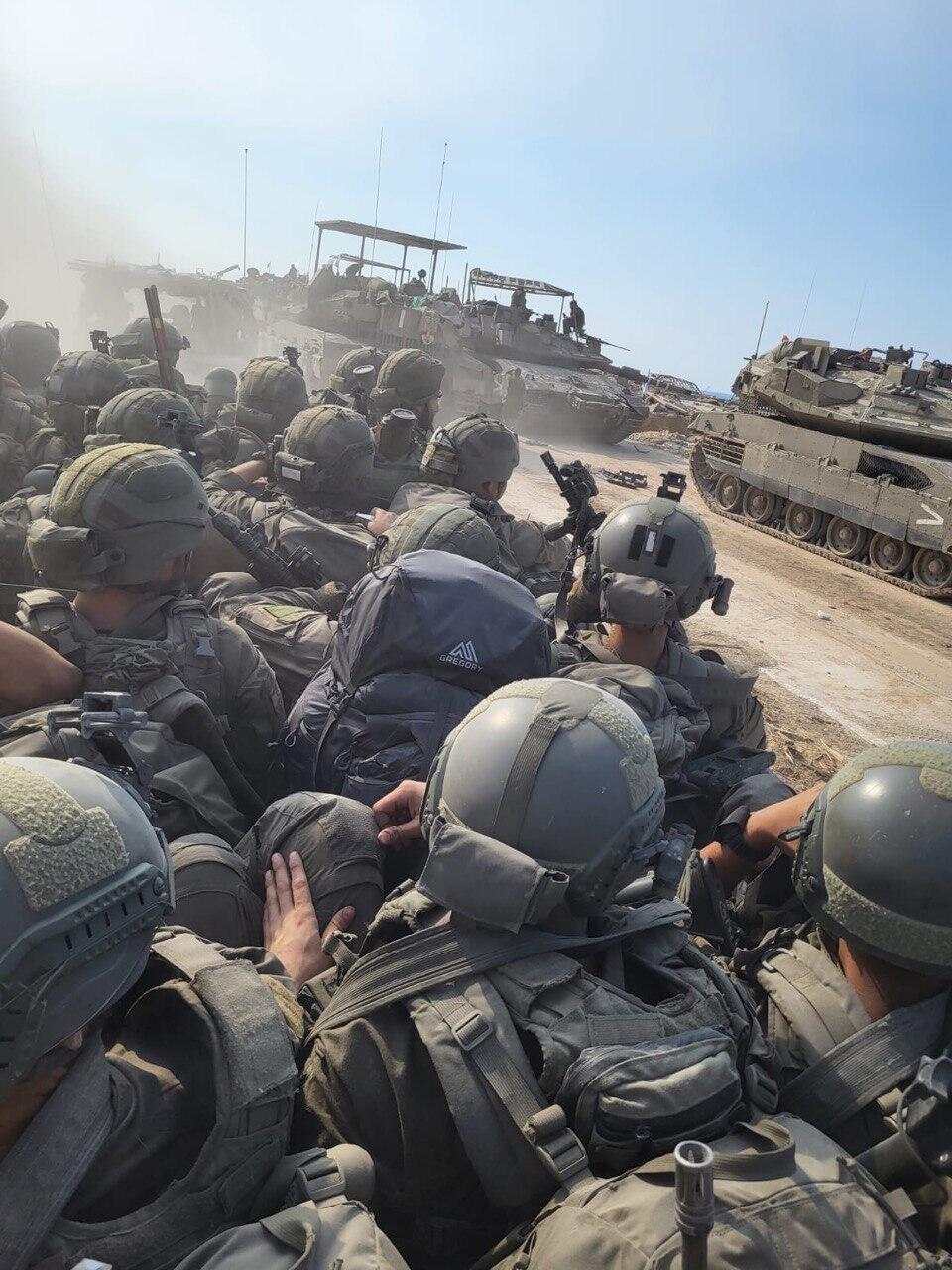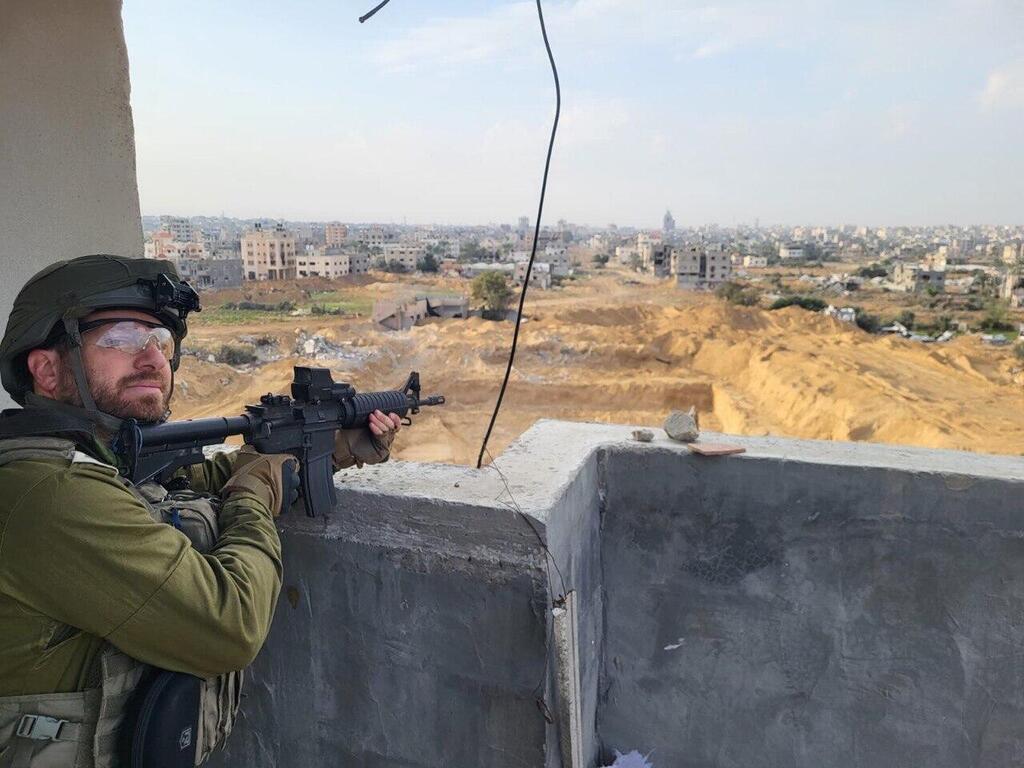Getting your Trinity Audio player ready...
In the heart of a battle in Gaza, amid the swirling dust and sand stirred by a Sikorsky helicopter primed for evacuation, Dr. Yaron Rudnitzky bent over a soldier lying on a stretcher. He wrapped him in a protective embrace, shielding his eyes from the gritty assault. "I'm a surgeon," he recounts, "specializing in severe trauma, but at that moment, all I could think about was how to protect the soldier’s eyes from the sand. In that instant, he felt like my own child. A moment later, he disappeared into the helicopter's belly, and he was no longer mine but someone else's, on his way to safety."
Dr. Yaron Rudnitzky, 43, married and a father of three, navigates life between two starkly different realms. On one hand, he treads the dusty and perilous grounds of Gaza, where he oversees medical care for commando soldiers wounded in combat as part of the Airborne Medical Unit. On the other, he steps into the sterile operating room at Meir Medical Center in Kfar Saba, a specialist in general and colorectal surgery, managing the colorectal and proctology surgery service.
The perpetual shift between the extreme emergencies of the battlefield and the precise medical care in the hospital creates a unique blend of treating injured soldiers in the field and providing routine medical care in civilian life. Ironically, he initially thought he would become a pediatrician. "I was convinced that would be my specialty," he says. "I led children, founded a scouting troop, and was a troop leader. But on the first day of medical school in Tel Aviv, they took us to the basement where the cadavers were, handed me a scalpel, and at that moment, I knew I would be a surgeon."
In an interview with Ynet, he reflects on October 7, describing the life between the battlefield and the hospital, and the deep bond, transcending beliefs and sectors, formed between him, the soldiers, and the medical teams. He shares about his family’s coping with this complex reality and explains why he won’t leave the country, even though "life in the United States is nicer."
"In a mass casualty event, everyone has a clear role: Surgeons and doctors provide treatment, and medics assist them," he explains, describing the division of labor in the field. "The role of the senior surgeon or anesthetist is to manage the mass casualty event (MCE) – to assess how many wounded there are, determine the severity of the injuries, and pair the appropriate team with each wounded.
"A soldier needing intubation will receive our anesthetist. A soldier requiring a chest drain will get the surgeon. A soldier suffering from anxiety will be treated by the psychiatrist. Meanwhile, resources must also be managed – blood units, evacuation vehicles. Nothing is sterile in Gaza. There's always gunfire around and unknown forces in the arena. We quickly understood that a poorly managed scene could cost soldiers’ lives – if we didn't evacuate the wounded according to priority, or if we were unaware of a wounded person treated by another force whose evacuation was delayed, there would be a price.
"My wife always complains that I'm not good at multitasking, but she should come and see how I manage an MCE – all the channels broadcasting at full strength, everyone talking and waiting for decisions, time ticking and the evacuation on the way, and amid all this noise, you have to decide who is in immediate danger and how to save them."
Racing south toward the carnage
On October 7, Rudnitzky was on trauma duty at the hospital. "The residents contacted me about a severe gunshot wound requiring urgent surgery. By 10:00 a.m., I was in the operating room, fighting for his life. In such surgeries, you are completely disconnected from everything happening outside – immersed in the internal world of the body you are operating on. But every few minutes, a nurse entered the operating room and updated us on the events outside: people were killed, terrorists were spotted in Sderot.
"Eventually, I asked her to stop. I told myself, 'We'll finish here, then I'll understand what's happening outside.' A few minutes later, I received a call from a unit friend, a senior anesthetist, who told me, 'Come, we're going down to Gaza.' I was still hands-deep in the patient’s intestines. The team closed him up, and we completed the procedure. Meanwhile, the nurse called my wife, placed the phone near my ear, and I asked her to prepare a bag for me. I finished the surgery at 2:00 p.m., reached the unit at 4 p.m., and we geared up. By 8 p.m., we were in the Gaza border region, treating the wounded."
What do you remember from those hours?
"I remember racing south, protected only by helmets and goggles. Around us, sirens and missiles lit up the sky, exploding above us, but we continued, engines roaring, stopping was not an option. We loaded weapons near Beit Kama and entered the border region. The road was a disaster zone – destroyed roads, pitch darkness, burnt vehicles, flames, a strong smell in the air, and bodies scattered on the road.
"We set up outside Kfar Aza. Forces from inside evacuated wounded to us one by one. We treated them on the road, stabilized them, and evacuated them with Unit 669 and United Hatzalah forces to helicopters or out of the border region, sending WhatsApp messages to friends in Soroka Medical Center, reporting what we were sending, and again receiving more wounded, more wounded – a conveyor belt, a cycle of battle and life-saving that lasted 36 continuous hours until Monday morning. The sights were hard, but the military training and surgical profession, focused on trauma, blood and death, teach you to keep calm and focus on the wounded. The hardest challenge is what the family goes through at home."
About a week after October 7, the entire unit moved to the southern town of Netivot under a lockdown. Soldiers were coming off nights of sleeping on the road or on the synagogue floor in Kibbutz Sa'ad. Initially they were still motivated, but, according to Rudnitzky, morale gradually declined, and operational tension dissipated. Questions like "What will happen," "Why are we here," and "How did we get into this situation" began to arise.
"Sinai, our psychiatrist, started talking about combat reaction and combat shock, and how to cope and process events during combat," he explains. "I, for my part, made sure to remind everyone to change socks and air their feet, which had been closed in shoes for a week, and to ensure they relieved themselves. Constipation can disable soldiers. After all, I'm also a proctologist."
Since that week, he has been journeying along the Gaza-Israel axis. “I was supposed to enter Khan Younis on a Tuesday," he recalls, "but on Sunday, right in the middle of a family dinner, I got an urgent call to head south. I was asked to replace a fellow surgeon from the unit who was in Khan Younis with the Duvdevan Unit. They had been involved in a clash during a raid on a Hamas compound. The team evacuated the severely wounded in an APC, but on the way out, it was hit by an RPG. The medical team was injured, and both wounded soldiers were killed. At the exchange point, I met my surgeon friend. He was covered in shrapnel wounds on his face, tired and sweating. He gave me a rundown of the incident and showed me the hole in the Achzarit. It was clear he was struggling with the outcome. He had given his all, and it hadn’t been enough. He got into another unit member's vehicle and headed north. I was left alone with a reserve force I didn’t know – a mix of former Givati soldiers, another unfamiliar doctor, and a force commander over 50 who looked like he hadn’t been home in months.
“The route to Khan Younis was, at that moment, a long, isolated dirt path cutting through the fields on an especially dark night with no moon. The drive was as slow and quiet as an APC can be when loaded with fighters and equipment. Suddenly, the vehicle was thrown to the side, and we all tumbled with it, leaning with our backs on the floor, stepping on each other, feet on ammunition boxes. We immediately disembarked and secured the area. It was pitch dark, and the silence was unbearable. I felt there wasn’t a living soul around, but your imagination runs wild, and you’re certain an RPG will send us flying any moment. We realized we hadn’t been hit by a missile but that the vehicle had fallen into a ditch. Luckily, we didn’t overturn into an abyss. I lay on the route, about 60 yards from the vehicles, next to a young soldier, a newcomer from the U.S. He reminded me of what it means to soldier at a security post in the middle of nowhere. Quietly urging me to stay crouched and speak in whispers, focus on the route and not on the rescuers. As young as he was, he was right.
“My thoughts drifted back home. I thought about my wife and kids, how I looked at them when the phone rang and I got the call-up. The girls fell silent, and my son began to ask – when? how? why now? And my heroic wife, struggling to hold back tears, because, despite the difficulty, she didn’t want to make it harder for me. I also thought about the friend I was now replacing, his injuries, and especially the pain in his eyes – about not being able to save the soldiers.”
The Airborne Medical Unit was founded about eight years ago to provide medical response deep in enemy territory. Its mission is to set up a field hospital deep in the area and provide life-saving treatment under challenging conditions. The unit comprises experienced doctors, some of whom are former elite unit members who became surgeons, anesthetists, and other specialists after their military service, as well as seasoned paramedics and medics. Rudnitzky himself served in Duvdevan and participated in significant operations and events during the Second Intifada, including the capture of Marwan Barghouti.
One of the major innovations of the Medical Corps in the Gaza war was the introduction of whole blood to the battlefield. The medical unit is the first unit to enter the field with blood units in coolers, something that had never been done before. “I remember the moment I realized how crucial it was,” he explains. “There was a tough encounter for Egoz and Maglan; we had six wounded, and we knew blood would be critical. We got into the vehicle and raced to the helipad with a cooler of cold blood units under our feet. I tucked a blood unit between my chest and the ceramic vest to warm it up so it would be ready for the wounded when we reached him. And that’s exactly what happened.”
Special bonds are forged in such extreme situations.
“Among us reservists, the bonds transcend time and space. The team becomes a second family, and when we meet, even if only once a year, it feels as if no time has passed. When the connections are so deep, time loses its meaning, and this shared experience is what makes the friendship so special. Everyone fights for each other. When I recall our circle, sitting around a coffee kit in the heart of shattered Gaza, the feeling is of true shared destiny – with the left-wing kibbutznik friend from Ma'agan Michael, the Druze from the north, the kippa-wearing medic from Moreshet, the commander from Moshav Nahalal, and the settler from Otniel. It’s an irreplaceable formative experience. We argued so much between cups of coffee. And I don’t even drink coffee. But how much love there is between us.”
Tell us about the soldiers, about morale, about your connection with them.
“The young soldiers, 20 years younger than us, bring with them fresh energy. They fight fiercely, with all the strength and determination the army expects from its fighters. But what’s special about them is the gap between their battlefield prowess and their youthful, friendly personalities. They are skilled and aggressive in combat, but when they’re not on duty, they’re just young guys, considerate and caring. As they walked in a convoy on the way out of a refugee camp, carrying heavy loads on their backs, we stood by the roadside and handed them chocolates as if they were marathon runners. None of them took a bite of the chocolate they received before looking back, cutting the bar in half, and offering it to the one behind him. This consideration, this genuine friendship, creates a sense of family even in the most extreme situations.”
And what about moments of fear and terror?
“In every combat situation, there’s fear. It’s an inseparable part of life in the field. The difference lies in how you deal with it. Every fighter knows the feeling of unrest in the head just before the battle, which dissipates after he runs a hand over his weapon, magazines and grenades, ensuring everything is in place. The combat doctor in the field runs a hand over his medic vest, checks the pockets – making sure the intubation kits, tourniquets, morphine and dressings are all within reach. Knowing all the medical equipment is in the right place provides a sense of security. What calms me in the field is knowing I’m prepared, and that we, the medical team, are the best people to treat the wounded soldiers. Our goal is to bring as many soldiers home to their mothers as possible. There’s a sense of mission in that, bringing calm amid all the chaos.”
And there’s also your own family, and the concern for them, and theirs for you.
“The distance from the family is very difficult. You’re in the field, dealing with combat, wounded and death, but the thoughts always wander home. There are moments when I know they’re worried about me, but I can’t do much to reassure them. I try to keep in touch with my wife as much as possible, and she manages the home front – supporting me from afar and helping other families, some with soldiers from my unit. For example, she initiated a support group for the wives of unit soldiers to ease the stress that accompanies the families. Not only did she take care of me and the kids, but she was also the supportive shoulder for other women going through exactly the same thing. Occasionally, I would send her the phone numbers of mothers of regular soldiers I met along the way who hadn’t talked to home in weeks, so she could call their moms to say I saw them and they’re okay. She spent hours on calls with them, filled with tears and laughter.”
In 2022, after a year and a half of advanced surgical specialization in the U.S., Rudnitzky returned with his family to Israel. Many of his friends preferred to stay there due to the better conditions.
“Life in the U.S. was easier, prettier and greener,” he admits, “but friends, culture and human closeness are what keep us here. Friends ask me why I stay here, with all the wars and difficulties. And I tell them –there’s no other place I can imagine living. Where else can I wake up in the morning, send the kids to school on foot, cycle to the hospital, walk into an operating room, smile and say good morning to the nurses, high-five the anesthetist who was with me in the reserves, laugh with the residents who don’t know who the lead singer of the band Tislam is, finish the surgery and come out to the family and cry and hug them out of joy that everything went well, get a reminder from my wife not to forget to pick up the kids on the way home, and in the evening sit with the neighbors for a beer without planning ahead, all in Hebrew.”





